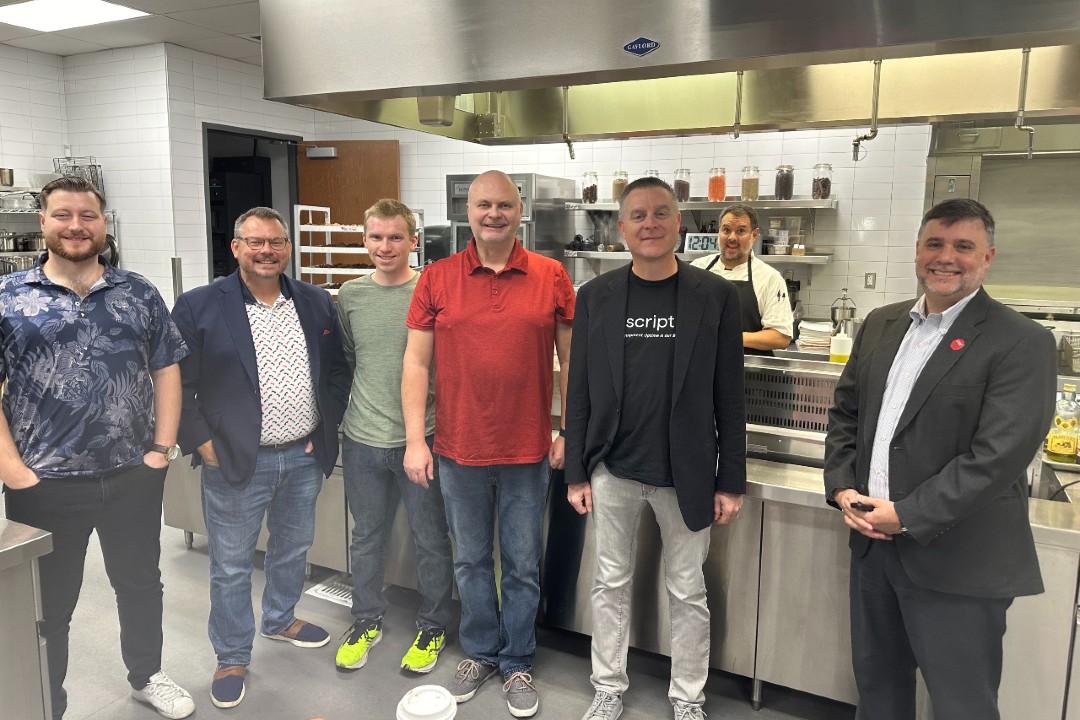With a fresh US$7.85-million investment in hand, Justin Villiers said Scription is supersizing its predictive maintenance tech that boosts profit margins for both quick-serve food operators and the maintenance companies they rely on.
"The secret of how this all works is preventive maintenance," Villiers, a co-founder, past CEO, and the current chief strategy officer for Scription, told Taproot. "When you pay maintenance workers per hour, they make the most amount of money when things break. It's a bit of a broken model."
Scription began in 2020 in Edmonton and has since opened offices in Calgary and Atlanta, GA. The American outpost is vital because most of Scription's clients are there, Villers said. Those clients are quick-serve franchisees, including those who run McDonald's, KFC, Taco Bell, Wendy's, and Dave's Hot Chicken (which opened its first Alberta location in March) locations.
Customers pay Scription a monthly fee for equipment maintenance services for their kitchen equipment, which makes money when working and costs a lot to react to and fix quickly when down. Villiers said Scription helps manage maintenance on a restaurateur's behalf, because preventative maintenance cuts costs for owners and boosts the bottom line for maintenance companies.
"The owner-operator benefits from this program because they have fewer breakdowns, more preventive maintenance, and less money going into the system," Villiers said. "So if less money is going into the system, is that hurting the service companies? Well, actually, the answer is no, because the margins are much better on preventive maintenance than they are on reactive maintenance. They can be almost twice as high."
Scription's latest round of seed funding joins US$2.5 million in pre-seed money the company raised in 2023. The new funds will be spent on growth, Villiers said. The announcement for the round also included the unveiling of new CEO, Gerritt Graham, who is an American startup advisor and former insurance executive. Villiers added that the Scription team is spread out. He's based in Ottawa, the service team's in Edmonton, the engineering team's in Calgary, and business development is mostly in the U.S.
Back here in Canada, Villiers said Scription just closed its first domestic deal with the owner-operator of a McDonald's.

Justin Villiers (left), chief strategy officer of Scription, alongside four colleagues from the company and David Cárdenas (right), who's the dean of the University of Las Vegas's hospitality college, where this photo was taken in October. (Supplied)
Does Scription appeal to local food businesses?
Jay Downton, president of Oodle Noodle, gave Taproot a local perspective on a subscription-maintenance model. He said one more bill for his franchisees might be a hard sell on paper, but that it's easier to manage a predictable expense than the alternative.
"No one likes to pay for maintenance," Downton said. "Maintenance can range from a $4,000-a-year item at some stores to upwards of $10,000 to $15,000, depending on what happens. It's so unpredictable."
Oodle Noodle has 18 locations spread between its franchisees, all of them in Alberta and most of them in the Edmonton region. They are divided between approximately 11 owners, four of whom own more than one location.
Meuwly's owner Peter Keith, who runs a shared commercial kitchen with eight tenants, told Taproot that he thinks the Scription model has similarities to health insurance.
"Repair of industrial food equipment is often expensive. There's a lot of specialized labour involved, so I think there would be demand in the industry," Keith said. "I could also imagine that lenders, like banks, might prefer to see something like this, because if someone can build that expense into their business plan, then they can kind of prove beforehand that their model works."
Villiers said Scription typically targets owner-operators with 20 or more locations, but owners with smaller portfolios can still subscribe. He also stressed that Scription does not meet the regulatory definition of an insurance product.
The cost of downtime
Villiers said it's not just the cost of repairs that can eat into the generally slim margins for quick-serve establishments. It's also downtime, when labour costs accrue without revenue to offset them. Scription suggests it can reduce downtime costs in restaurants by more than 60%, depending on the number of stores and the equipment a client has.
Villiers compared Scription to the Power-by-the-Hour program that automaker Rolls-Royce invented in 1962.
"If an automotive plant goes down, it can sometimes lose seven figures per hour," Villiers said. "If you come down to these middle markets, like quick-serve food, there hasn't been such an incentive for maintenance subscriptions yet. (Scription's work has) really been about having a new player leverage technology to come in, execute, take a model that works for aerospace and all these other industries, and apply it here."
Scription isn't the only Edmonton startup to offer cost savings through predictive maintenance. Nanoprecise Sci Corp focuses on predictive maintenance for industrial manufacturing. That company announced US$38 million in Series C funding in March, marking the second-highest venture capital deal in Canada's first quarter of the year.
